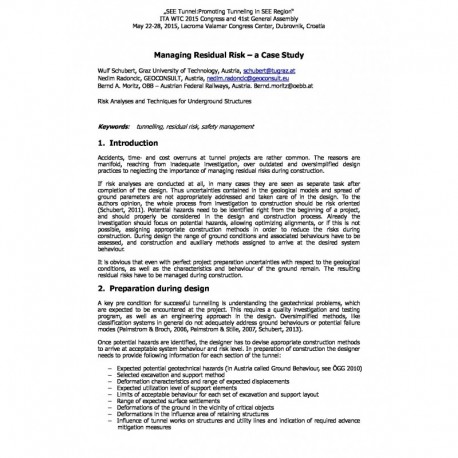Cart
0
0
No document
0,00 €
Total
Document successfully added to your shopping cart
Quantity
Total
There are 0 items in your cart.
There is 1 item in your cart.
Total documents
Total shipping
To be determined
Total
Search & filter
Search for a publication
Search & filter
Viewed documents
Managing Residual Risk – a Case Study
wtc2015_full_schubert.docx
W. Schubert / N. Radončić / B. A. Moritz
Accidents, time- and cost overruns at tunnel projects are rather common. The reasons are manifold, reaching from inadequate investigation, over outdated and oversimplified design practices to neglecting the importance of managing residual risks during construction. If risk analyses are conducted at all, in many cases they are seen as separate task after completion of the design. Thus uncertainties contained in the geological models and spread of ground parameters are not appropriately addressed and taken care of in the design. To the authors opinion, the whole process from investigation to construction should be risk oriented (Schubert, 2011). Potential hazards need to be identified right from the beginning of a project, and should properly be considered in the design and construction process. Already the investigation should focus on potential hazards, allowing optimizing alignments, or if this is not possible, assigning appropriate construction methods in order to reduce the risks during construction. During design the range of ground conditions and associated behaviours have to be assessed, and construction and auxiliary methods assigned to arrive at the desired system behaviour. It is obvious that even with perfect project preparation uncertainties with respect to the geological conditions, as well as the characteristics and behaviour of the ground remain. The resulting residual risks have to be managed during construction.




